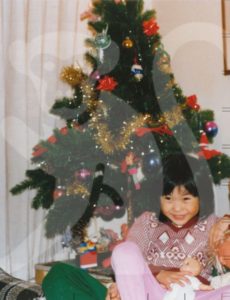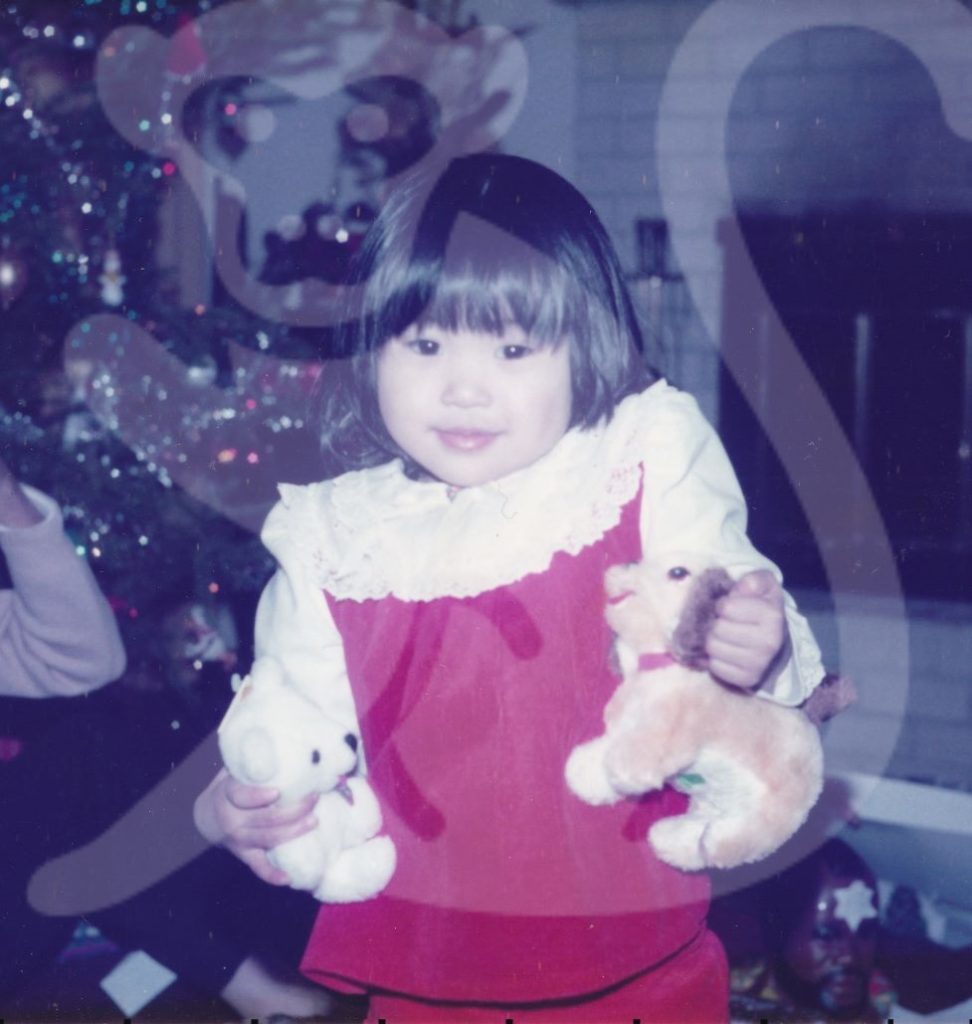“Vietnamese people love Christmas!” That’s what I usually say when someone asks me whether I celebrate the holiday, and I try to explain why I am both a lifelong Buddhist and a Christmas enthusiast. But the real answer is a little more complicated.
I was a baby when my family came to the US as refugees in the early 1980s, and ever since I can remember, we have celebrated Christmas in the non-religious way that many Americans do. I have warm memories of family gatherings, delicious meals, and mounds of presents, and I always eagerly participated in the Christmas pageant at my otherwise secular school. I loved the holiday so much that I was puzzled by the controversies over public displays of decorated trees and the presence of Christmas in public schools like mine. I myself was non-Christian and never felt excluded by any of those cultural expressions of the holiday, and I simply couldn’t understand why other non-Christians would find them alienating. My parents were unbothered by it too. I don’t think they ever felt that it made us any less Buddhist to have fun on someone else’s holiday, and they were never worried that the glamour of Christmas would make me and my sibling leave our faith. Indeed, I was a zealous believer in candy canes but never became interested in Jesus.
I think we embraced Christmas in part because it was a way of becoming American, and the holiday served as an annual reminder that we had remade our lives in our adopted homeland. When we put up our artificial tree each year, we remembered our early years of struggle in this country, when we received the tree and our ornaments secondhand from local charities. When we opened our presents, my sibling and I remembered that some of our first Christmas gifts came from churches and nonprofits staffed with smiling volunteers. Hanging up stockings and lights made my family feel like we had made it and could finally share in the confident prosperity of our native-born, economically-secure neighbors. Celebrating Christmas meant that America was now our home.

Yet the holiday season was also bittersweet, especially when we heard the song, “White Christmas.” Irving Berlin’s song is a nostalgic carol for many Americans but was a painful memory for my mom because she associated it with the fall of Saigon. In late April 1975, as the war was about to end, the American military radio in Vietnam played “White Christmas” on repeat as a secret signal to all remaining US personnel to evacuate the country. My mom heard the song on the radio and thought it was an odd time for the Americans to be listening to Christmas carols. Only later did she realize that it marked the beginning of the end. She and my dad regarded the defeat of the Republic of Vietnam (RVN, or South Vietnam) as the saddest day of their lives, the moment when poverty and oppression abruptly blighted their hopes of a better future for their family and their country. My parents were grateful to have escaped the nightmare of postwar Vietnam, but “White Christmas” brought all those memories flooding back, and no amount of American Christmas cheer could ever dissolve that sadness.
I used to believe that my family enjoyed Christmas so much because Vietnamese Buddhists were exceptionally open to other religions. My parents always insisted that Vietnamese culture tolerated syncretism and considered it acceptable for an individual to subscribe to multiple faiths. Whereas Christianity has historically been the single dominant religion in the West, three different doctrines shaped the culture and society of Vietnam and much of East Asia in traditional times. My philosophically-inclined dad liked to point out that Confucianism, Daoism, and Buddhism were not mutually exclusive and that there was so much intermixing that they were often described collectively as the “Three Teachings” (Tam Giáo). Besides these scriptural doctrines, the Vietnamese also worshipped their ancestors and a variety of local cults. If my family could worship our ancestors and practice Buddhism, what did it matter if we added yet another holiday? My dad liked to argue that Jesus sounded like a good person who encouraged kindness towards others, so anyone could celebrate Christmas regardless of religious affiliation. More pragmatically, he reasoned that he didn’t get many vacation days, so we might as well have a party, and it would feel sad not to celebrate when everyone around us was doing so. Given my parents’ rationalization, I assumed that if we had resettled in a country with a Muslim- or Jewish-majority population, we would have gamely adopted their holidays too. Looking back, I realize that these claims about religious tolerance constituted a highly selective and self-flattering interpretation of the Vietnamese past.
Yet there was a cultural reason why my Buddhist family readily accepted a Christian holiday, and it had more to do with the very specific milieu in which my parents came of age than any essential quality about Vietnamese culture. When I was a kid, they often boasted that Christmas was even more fun in Vietnam. My mom reminisced about all the romantic dates she and my dad enjoyed during the holiday season before the war ended and before they got married. My parents would hold hands and stroll along the Saigon River on Christmas Eve, basking in the warm weather, admiring the pretty lights, and watching other young lovers do the same. In contrast, my mom found Christmas in America cold and dreary, utterly lacking Saigon’s festive atmosphere.
I eventually experienced this alternative version of the holiday years later when I moved to Saigon for dissertation research, and I realized that Vietnamese people have a totally different understanding of Christmas. Most Americans think of it as a family holiday to be celebrated at home and, for observant Christians, a religious holiday to be commemorated at church. In contrast, the vast majority of people in Saigon regard Christmas Eve as a going out holiday similar to New Year’s Eve or Valentine’s Day, and the place to celebrate is often in the streets. I remember walking through downtown Saigon the night before Christmas, and it felt like a huge block party had taken over the city. Canoodling couples posed for pictures in front of holiday decoration, groups of teenagers were there to see and been seen in their coolest clothes, and families treated their adorable little ones to snacks and toys. There was no sign of the religious character of the holiday at all. I knew that Catholic churches throughout the city were holding services for the faithful that night, but religion was the furthest thing from the mind of the revelers. The festivities ended in the early morning hours, and Christmas Day itself was just another ordinary day for most Vietnamese unless they were practicing Christians.
Most observers point to Western influence to account for this peculiarly Vietnamese love of Christmas. Vietnam was a French colony from the mid-19th to mid-20th century, and the RVN was deeply influenced by the US during the Vietnam War. Yet the vague explanation of Western influence hardly accounts for the very particular way in which many Vietnamese celebrate the holiday. Why do they party in the streets rather than at home? Why on Christmas Eve rather than Christmas Day?
I have a theory to explain this puzzle (and it’s just a theory). I think that the custom of late-night public revelry can be traced back to the ways in which middle- and upper-class Saigon residents selectively adopted aspects of French culture during the colonial period. France is a predominantly Catholic country, and its holiday traditions include attending midnight mass on Christmas Eve, followed by a festive meal and hours-long party known as the réveillon. The signature dessert is the bûche de Noël, or Yule Log, and the crèche, or miniature nativity scene, has historically been the primary symbol of Christmas rather than the more Germanic Christmas tree. In colonized Vietnam, French traditions had a stronger presence in the cities than the countryside because most colonial institutions and the majority of the French settler population were concentrated in urban areas. Saigon endured continuous colonial rule longer any other major city in the country and was arguably Vietnam’s most gallicized city. Within Saigon and other cities, middle- and upper-class Vietnamese received greater exposure to French culture than their poorer neighbors. Well-off urbanites learned to speak French fluently in colonial schools and could secure well-paying professional jobs in the civil service. In short, the Saigon elite were the Frenchest Vietnamese in the entire country and very proudly so.
I speculate that it was these Vietnamese who helped popularize certain French Christmas customs and transform them into a Vietnamese tradition. Educated urbanites were largely non-Catholic and therefore did not attend church, but there was no reason why they couldn’t celebrate réveillon. Staying up late and partying is not contrary to Buddhism or any popular religion in Vietnam, and the custom probably didn’t seem especially religious to many Vietnamese. After all, the French also observe a secular réveillon on New Year’s Eve, which is often celebrated with friends rather than family, and revelers sometimes congregate in public places to ring in the new year. It helped that Catholic holidays were public holidays under the colonial government, and Vietnamese civil servants received a vacation day regardless of what faith they confessed. Many government workers likely decided to have party simply because they had the time off similar to my dad’s reasoning decades later. With all these factors considered, my educated guess is that celebrating réveillon was a sign of cosmopolitanism and social status for this class of Vietnamese rather than an expression of religiosity.
Over time, the urban elite appeared to have turned a French Catholic custom into a Vietnamese cultural practice. My middle-class parents grew up in Saigon after independence, and they and other non-Catholics of their generation inherited colonial-era attitudes towards Christmas. They regarded church attendance as religious but were perfectly happy to throw a party or go out on Christmas Eve. They indulged in bûche de Noël as a seasonal treat,and some even displayed a French-style nativity scene. The heavy American presence during the Vietnam War reinforced the popularity of the Christian holiday, and my parents and their friends continued partying the Vietnamese way even as they began listening to American Christmas carols like “White Christmas.” Their generation passed on the tradition of réveillon-minus-churchto those that followed, and the throngs of revelers I saw in Saigon that Christmas Eve were a testament to the vibrancy of this Vietnamese holiday custom.
My family continued to view Christmas as cool and fun rather than sectarian when we settled in the US. What we didn’t realize was that many Americans also celebrated Christmas as a cultural holiday and didn’t go to church as well. This lucky coincidence meant that American Christmas felt familiar to us, and all we had to do was make minor adjustments to our preexisting custom. So we celebrated at home instead of going out and swapped out the French bûche de Noël in favor of American candy canes. The underlying similarity likely explains why my family, as Vietnamese Buddhists, did not feel alienated by public displays of nativity scenes and the ubiquity of carols like many other non-Christian Americans did during the holiday season. For us but not necessarily for them, celebrating Christmas was an affirmation of our cultural heritage as a middle-class Saigon family even if it had nothing to do with our religious practice.

